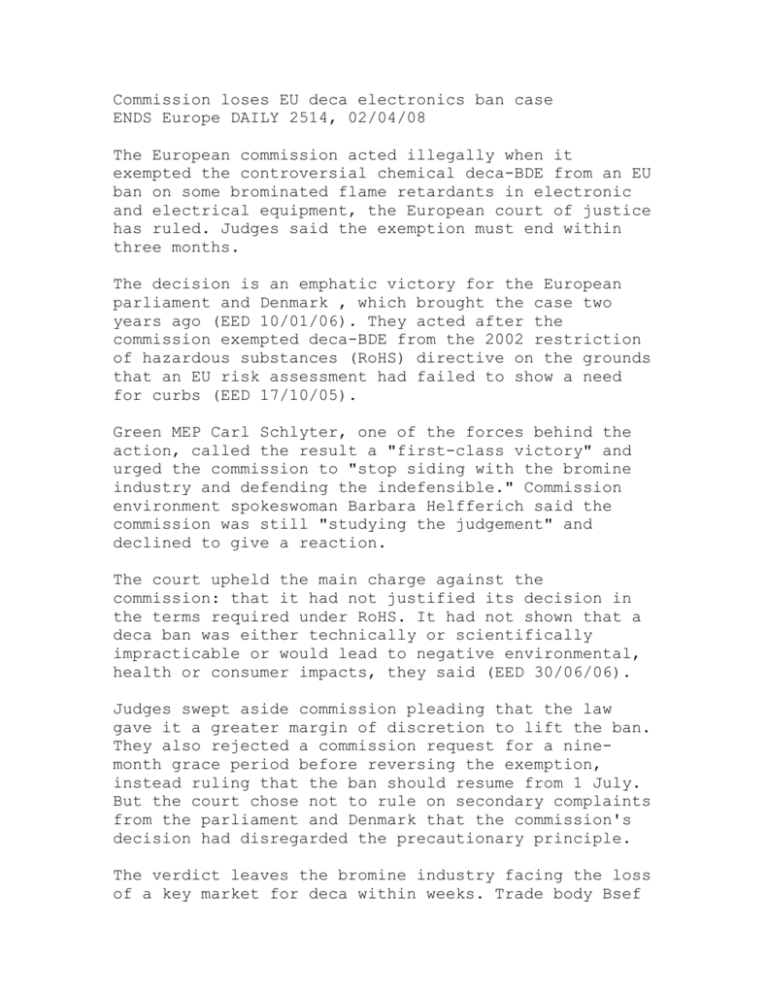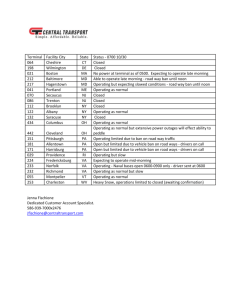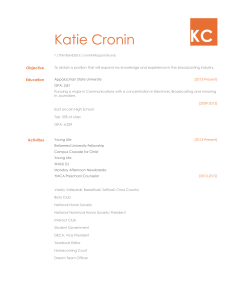Commission loses EU deca electronics ban case
advertisement

Commission loses EU deca electronics ban case ENDS Europe DAILY 2514, 02/04/08 The European commission acted illegally when it exempted the controversial chemical deca-BDE from an EU ban on some brominated flame retardants in electronic and electrical equipment, the European court of justice has ruled. Judges said the exemption must end within three months. The decision is an emphatic victory for the European parliament and Denmark , which brought the case two years ago (EED 10/01/06). They acted after the commission exempted deca-BDE from the 2002 restriction of hazardous substances (RoHS) directive on the grounds that an EU risk assessment had failed to show a need for curbs (EED 17/10/05). Green MEP Carl Schlyter, one of the forces behind the action, called the result a "first-class victory" and urged the commission to "stop siding with the bromine industry and defending the indefensible." Commission environment spokeswoman Barbara Helfferich said the commission was still "studying the judgement" and declined to give a reaction. The court upheld the main charge against the commission: that it had not justified its decision in the terms required under RoHS. It had not shown that a deca ban was either technically or scientifically impracticable or would lead to negative environmental, health or consumer impacts, they said (EED 30/06/06). Judges swept aside commission pleading that the law gave it a greater margin of discretion to lift the ban. They also rejected a commission request for a ninemonth grace period before reversing the exemption, instead ruling that the ban should resume from 1 July. But the court chose not to rule on secondary complaints from the parliament and Denmark that the commission's decision had disregarded the precautionary principle. The verdict leaves the bromine industry facing the loss of a key market for deca within weeks. Trade body Bsef put a brave face on the defeat, insisting that the court had not questioned the EU risk assessment. Bsef chairman Michael Spiegelstein called on the commission to "reconcile the inconsistency" between the assessment and the RoHS directive, either by proposing a new ban exemption under a different justification, or by revising the law entirely. "I can't and I will not comment on that," Ms Helfferich told ENDS today. But the chances of the commission trying again to push through an exemption for deca appear slim: environment commissioner Stavros Dimas is thought to privately favour a ban on deca, and his department has previously tried to exclude it from the market through a technicality (EED 28/06/06). Moreover, EU governments, which would need to approve any exemption, are split on the issue. Several governments intervened in support of the parliament and Denmark: Sweden, Finland, Portugal and Norway, where, by coincidence, a near-total ban on deca entered force on the day of the judgement (EED 18/01/08). Only the UK , which performed part of the risk assessment, supported the commission. Anti-deca campaigners were jubilant. WWF said it was "relieved that the substance will finally be banned", while Doreen Federigo of the EEB said the judgement would have "positive repercussions around the world". Leading manufacturers had already phased out deca in electronics, proving that safer alternatives were available, she said. Follow-up: European court of justice, tel: +352 43031, plus judgement in case C-14/06. See also Bsef reaction to court verdict and Norwegian ban, and reaction from the Greens, WWF and EEB coalition.









